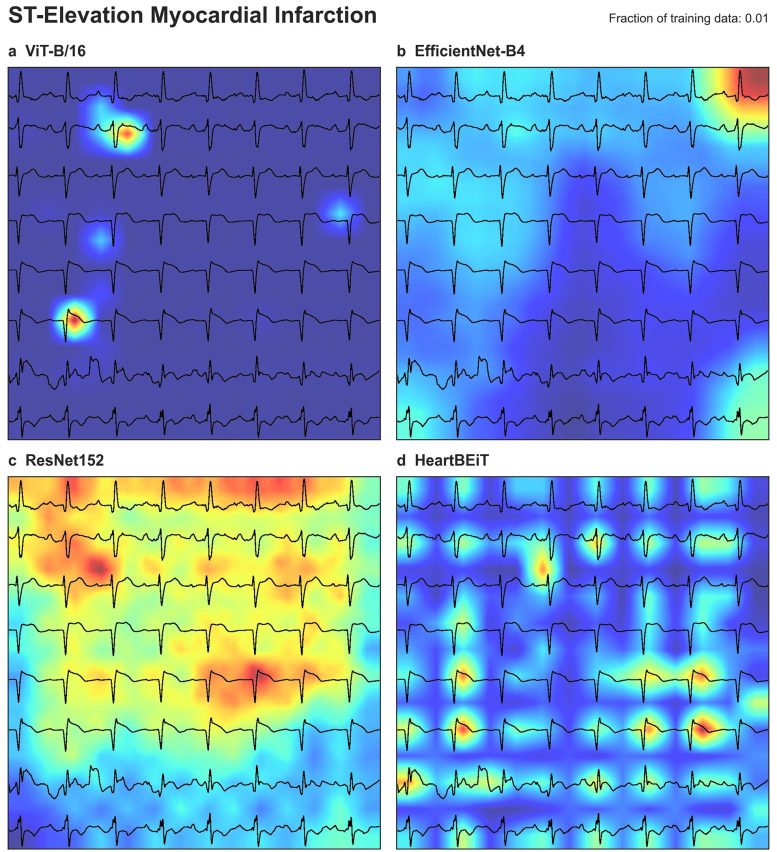
Mount Sinai’s AI model, HeartBEiT, improves the accuracy and detail of ECG diagnoses, even for rare conditions with limited data. It interprets ECGs as language and outperforms traditional CNNs, highlighting specific ECG areas responsible for heart conditions.
Mount Sinai researchers have developed an innovative artificial intelligence (AI) model for electrocardiogram (ECG) analysis that allows for the interpretation of ECGs as language. This approach can enhance the accuracy and effectiveness of ECG-related diagnoses, especially for cardiac conditions where limited data is available on which to train.
In a study published in the June 6 online issue of npj Digital Medicine, the team reported that its new deep learning model, known as HeartBEiT, forms a foundation upon which specialized diagnostic models can be created. The team noted that in comparison tests, models created using HeartBEiT surpassed established methods for ECG analysis.
“Our model consistently outperformed convolutional neural networks [CNNs], which are commonly used machine learning algorithms for computer vision tasks. Such CNNs are often pretrained on publicly available images of real-world objects,” says first author Akhil Vaid, MD, Instructor of Data-Driven and Digital Medicine (D3M) at the Icahn School of Medicine at Mount Sinai. “Because HeartBEiT is specialized to ECGs, it can perform as well as, if not better than, these methods using a tenth of the data. This makes ECG-based diagnosis considerably more viable, especially for rare conditions which affect fewer patients and therefore have limited data available.”
Thanks to their low cost, non-invasiveness, and wide applicability to cardiac disease, more than 100 million electrocardiograms are performed each year in the United States alone. Nonetheless, the ECG’s usefulness is limited in scope since physicians cannot consistently identify, with the naked eye, patterns representative of disease, particularly for conditions which do not have established diagnostic criteria or where such patterns may be too subtle or chaotic for human interpretation. Artificial intelligence is now revolutionizing the science, however, with most of the work to date centered on CNNs.
Mount Sinai is taking the field in a bold new direction by building on the intense interest in so-called generative AI systems such as ChatGPT, which are built on transformers—deep learning models that are trained on massive datasets of text to generate human-like responses to prompts from users on almost any topic. Researchers are using a related image-generating model to create discrete representations of small parts of the ECG, enabling analysis of the ECG as language.
“These representations may be considered individual words, and the whole ECG a single document,” explains Dr. Vaid. “HeartBEiT understands the relationships between these representations and uses this understanding to perform downstream diagnostic tasks more effectively. The three tasks we tested the model on were learning if a patient is having a heart attack, if they have a genetic disorder called hypertrophic cardiomyopathy, and how effectively their heart is functioning. In each case, our model performed better than all other tested baselines.”
Enhancing Clinical Understanding and Diagnostic Accuracy
Researchers pretrained HeartBEiT on 8.5 million ECGs from 2.1 million patients collected over four decades from four hospitals within the Mount Sinai Health System. Then they tested its performance against standard CNN architectures in the three cardiac diagnostic areas. The study found that HeartBEiT had significantly higher performance at lower sample sizes, along with better “explainability.” Elaborates senior author Girish Nadkarni, MD, MPH, Irene and Dr. Arthur M. Fishberg Professor of Medicine at Icahn Mount Sinai, Director of The Charles Bronfman Institute of Personalized Medicine, and System Chief, Division of Data-Driven and Digital Medicine, Department of Medicine: “Neural networks are considered black boxes, but our model was much more specific in highlighting the region of the ECG responsible for a diagnosis, such as a heart attack, which helps clinicians to better understand the underlying pathology. By comparison, the CNN explanations were vague even when they correctly identified a diagnosis.”
Indeed, through its sophisticated new modeling architecture, the Mount Sinai team has greatly enhanced the manner and opportunities by which physicians can interact with the ECG. “We want to be clear that artificial intelligence is by no means replacing diagnosis by professionals from ECGs,” explained Dr. Nadkarni, “but rather augmenting the ability of that medium in an exciting and compelling new way to detect heart problems and monitor the heart’s health.”
The paper is titled “A foundational vision transformer improves diagnostic performance for electrocardiograms.”
Reference: “A foundational vision transformer improves diagnostic performance for electrocardiograms” by Akhil Vaid, Joy Jiang, Ashwin Sawant, Stamatios Lerakis, Edgar Argulian, Yuri Ahuja, Joshua Lampert, Alexander Charney, Hayit Greenspan, Jagat Narula, Benjamin Glicksberg and Girish N Nadkarni, 6 June 2023, npj Digital Medicine.
DOI: 10.1038/s41746-023-00840-9
This study was funded by the National Heart, Lung, and Blood Institute of the NIH, grant number R01HL155915, and by the National Center for Advancing Translational Sciences of the NIH, grant number UL1TR004419.
Never miss a breakthrough: Join the SciTechDaily newsletter.